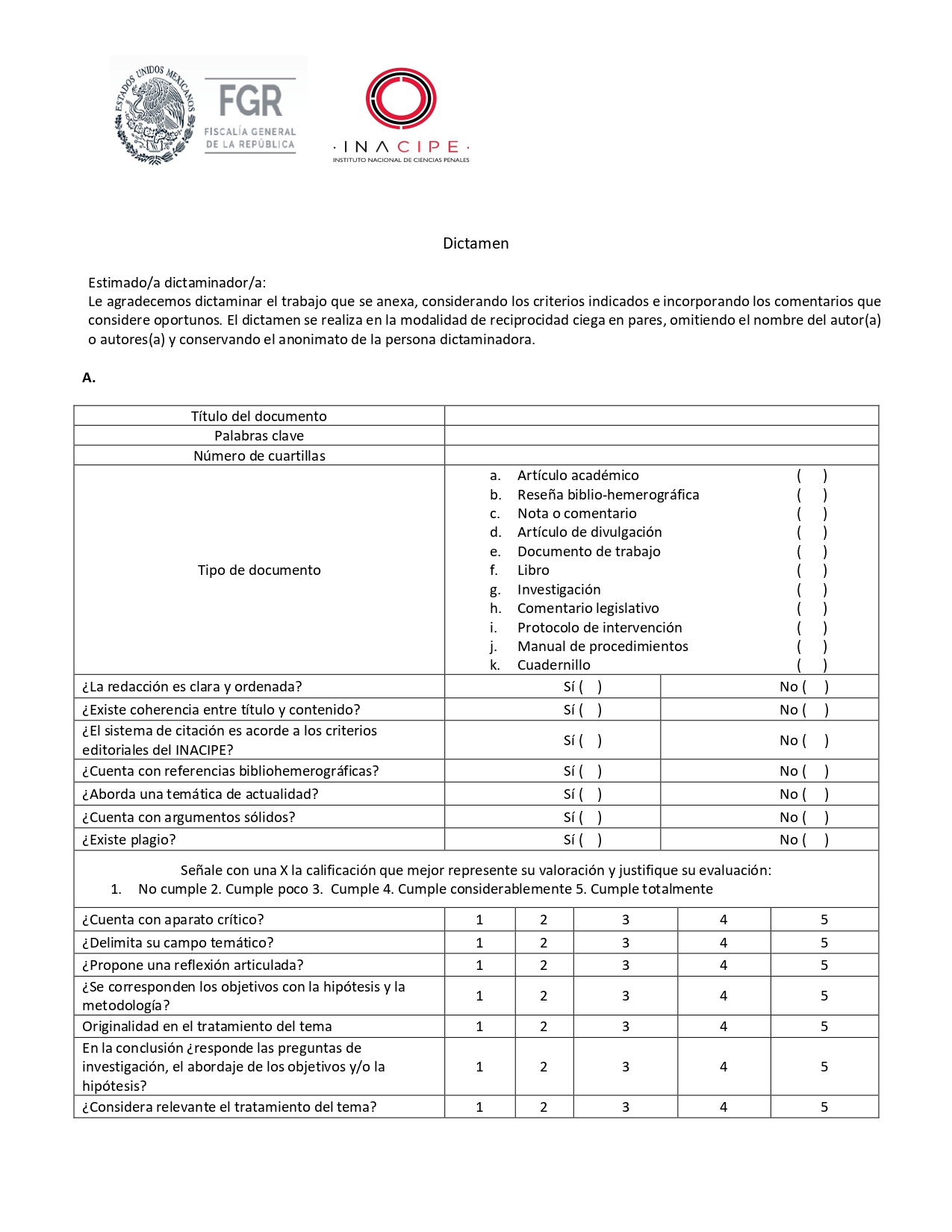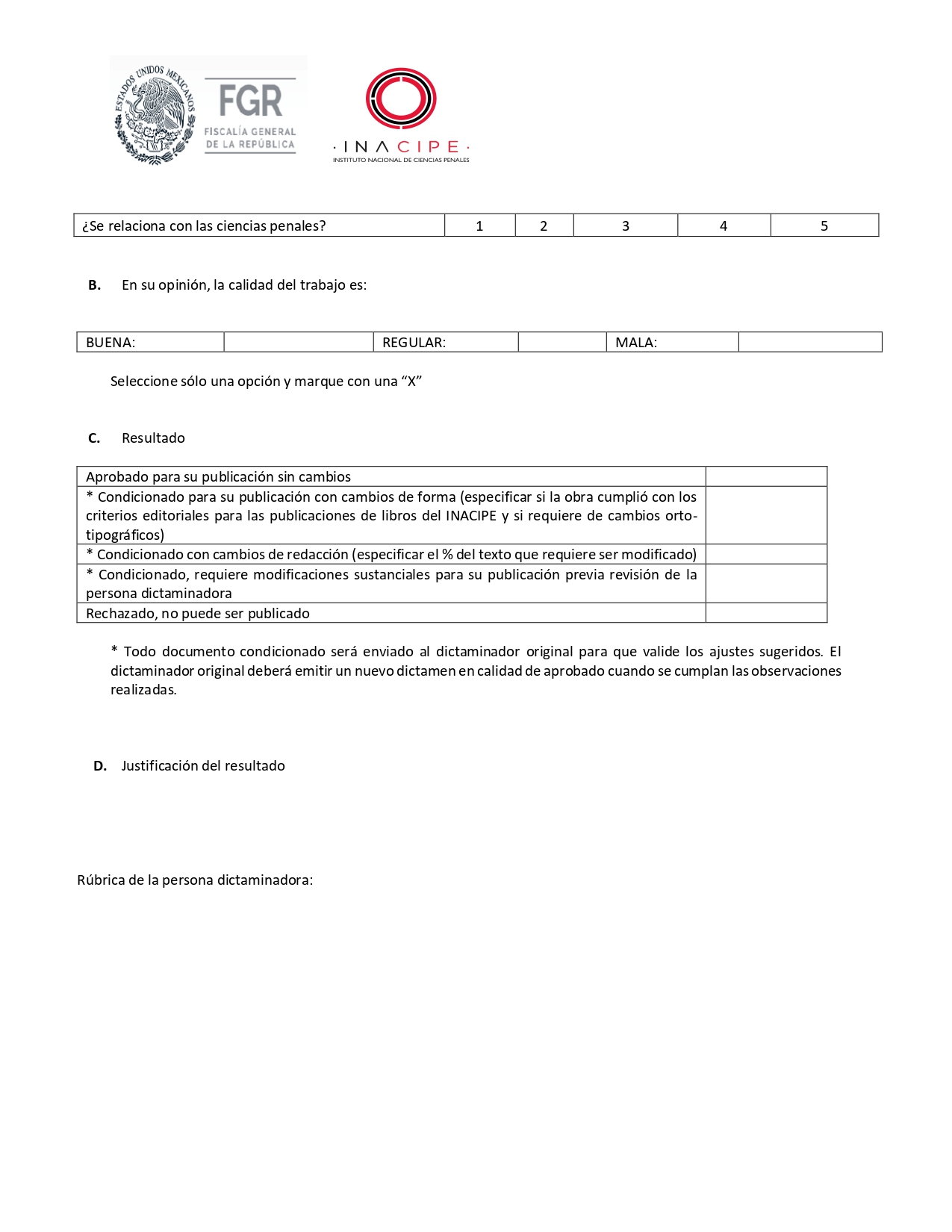Editorial Policy
Documentary typology
The Mexican Journal of Criminal Sciences is multidisciplinary, this is because, as Luis Jiménez de Asúa refers, criminal sciences are classified into six and have subdivisions; first is criminology that includes the following disciplines: anthropology, psychology, biology and sociology; second, criminology, whose subdivisions are philosophy, history, and dogmatics; then there are criminal, criminal procedure and penitentiary rights and, finally, three auxiliary sciences: statistics, legal medicine and forensic psychiatry. Thus, it is clear that the authors of articles, reviews, interviews, chronicles and other materials, enjoy specialized training that ensures the quality of said texts.
Additionally, it also works with criminal and security policy. Thus, it is a magazine that affects different disciplines and sciences as long as they seek to understand the crime phenomenon from different approache.
Reading circle
The scientific nature of the Mexican Journal of Criminal Sciences does not imply that it is exclusively intended for experts in law and other disciplines that require obtaining academic degrees; On the contrary, the desire of the National Institute of Criminal Sciences in publishing this work consists in enlightening the greatest number of people in terms of its content. The increase in communication media in recent decades has made knowledge available to literally anyone, since the global village is constantly populated by people interested in knowing as much as possible about their environment. In this sense, the Mexican Journal of Criminal Sciences is addressed to everyone, without any distinction; from curiosity to ongoing studies of budding professionals may be satisfied with the material offered on these pages.
Evaluation of collaborations
All collaborations will be subject to the editorial guidelines and the requested documentary type. The texts will be sent through the platform and will be evaluated by the editorial area to verify that the text meets the editorial criteria. In case of non-compliance with the guidelines, the editorial board may reject the text. If the collaboration complies with the requested form requirements, the articles will be sent for an opinion according to the format approved by the INACIPE Research Directorate.


The result of the opinion can be approved, rejected or conditioned. If the collaboration is approved, the article will be prepared for publication in the number that the publisher considers pertinent. In case of being conditioned, the author will be notified of the need to solve the evaluator's recommendations. Once corrected, the article can be submitted again to an opinion for approval, if deemed necessary.
If the result of the opinion is negative, the author may request reconsideration, so the journal's management may send the article for a second opinion. If a collaboration obtains two negative results, it will be discarded.
Any unforeseen controversy will be resolved by the Editorial Committee.
Time between receipt and publication of articles
The times between receipt and publication of articles vary according to the needs of the Journal according to the following:
1. Once the collaboration is received, it will be submitted to an opinion;
2. The evaluator will have a maximum of one month to issue the result;
3. Once the positive result is obtained, the collaboration will be formed for its publication.
The publication time of the approved contributions will depend on their subject matter.
Each issue of the RMCP has a specific theme. The approved articles that fit the theme of the issue will be published. Those who do not fit the theme will be scheduled in upcoming numbers that handle information similar to the accepted collaboration. The publishing house of the RMCP will announce in a timely manner, the themes of its issues and the calls for receiving texts.
Editorial guidelines
- The works must be sent through the platform, prior registration of the author. In case of complications, contact the email revista.mexicana@inacipe.gob.mx.
- The contributions will be unpublished and their authors will be exclusively responsible for them. Also, on the first page they will include title, summary, analytical summary (of approximately 100 words) and, at least, five keywords. The author or, where appropriate, the authors, should write down their full name and add a curriculum review and an email.
- The text must have a minimum of 10 and a maximum of 25 pages, except in the case of reviews, which will have a minimum of 5 and a maximum of 7 pages. (The specifications regarding the length may vary, depending on the observations in the corresponding opinion, or on an agreement between the author or authors and the Editorial Committee.)
- When the relevance of the articles warrants it, the journal may admit academic texts written in a language other than Spanish; for such purposes, the article may be sent for translation; In this case, the RMCP will give credit to the translator, who assumes responsibility for the translation.
- Bibliographic, newspaper and digital references must adhere to the APA format.
- Illustrations and graphics will be inserted in the text and must be prepared for reproduction and numbered consecutively.
- The works will be evaluated according to the double blind system. No changes to the text will be accepted after the collaboration is approved.
- The author or authors must assign to the National Institute of Criminal Sciences (INACIPE), exclusively, the reproduction rights. In accordance with the regulations of the Open Journal system, if the author or third parties wish to reproduce the text, this will be allowed as long as it is indicated that the article was published in INACIPE and whenever it is a reproduction for academic purposes.
- No collaboration that does not adhere to these guidelines will be accepted.
- Submission of manuscripts implies acceptance of the guidelines.
Gratuidad de la recepción y publicación de los artículos
Revista Mexicana de Ciencias Penales does not charge the author(s) for the services of reception, publication or for the work and services that are carried out during the editing process of the texts.
